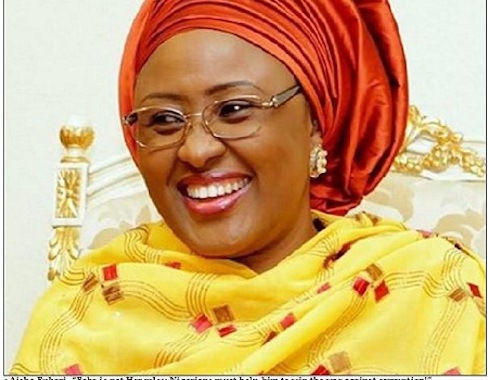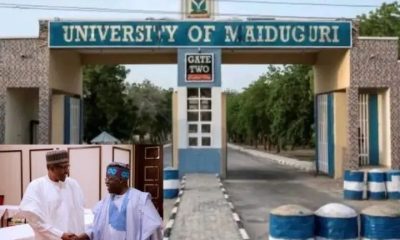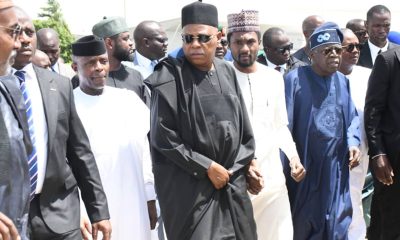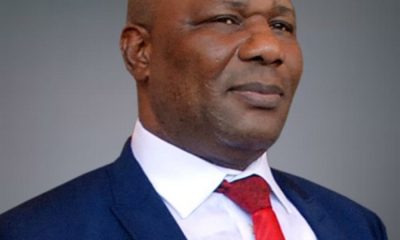COVER
Buhari Signs N10.594trn 2020 Budget into Law
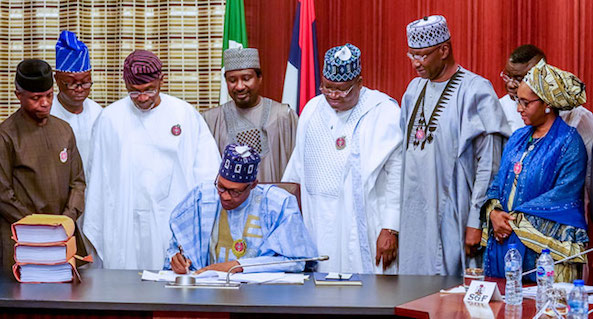
By Orkula Shaagee & Mathew Dadiya, Abuja
President Muhammadu Buhari has signed into law, the 2020 Appropriation Bill of N10,594,362,364,830.
The budget, which was increased from N10.
33 trillion to N10.594billion by the National Assembly, was signed yesterday in Abuja.The 2020 budget showed that N560.
47 billion of the total amount would go for statutory transfers, while N2.7 trillion would be for debt servicing.The breakdown also includes N4,842,974,600,640 for recurrent expenditure; N2,465,418,006,955 for capital expenditure, while fiscal deficit would gulp N2.
28 trillion and Deficit/GDP N1.52 per cent.The budget also maintained Nigeria’s daily oil production rate at 2.18 million per barrel, per day, but increased the oil benchmark price to $57 per barrel against the $55 proposed by the Executive.
Recall that the Senate and the House of Representatives passed the budget, early this month at their various sittings with an increase higher than the N10.33 trillion presented by President Muhammadu Buhari on October 8, 2019.
In the Senate, the passage of the budget followed the adoption of the report of its Committee on Appropriations at plenary.
Presenting the report, the chairman of the panel, Senator Barau Jibrin, said the increase of N264 billion allowed for interventions in critical areas such as national security, road infrastructure mines and steel development, health among others.
Jibrin said the statutory transfer stood at N560.5bn, Recurrent Expenditure-N4.8trn, Capital Expenditure-N2.5trn, Debt Servicing-N2.7trn, Fiscal Deficit-N2.3trn and Deficit to GDP of 1.52 per cent.
He said the daily oil production stood at 2.18m barrels per day, oil benchmark was increased from $55 to $57 per barrel proposed by the Executive, while the exchange rate remained N305 per dollar.
Similarly, the House of Representatives, also adopted the report of its committee on Appropriations presented by the Chairman.
The House had received the final report of the budget from the Appropriation Committee also with an increase to 10.594 trillion, from the amount presented by President Buhari.
The National Assembly also had a jerk in its budget to 128 billion from the proposition of 125 billion by the president.
The National Assembly, INEC, National Human Rights Commission, and Basic Health Care Fund fall in this category.
Others were NJC, NDDC, NEDC, UBEC, and the Public Complaints Commission.
Also, 2.7 trillion would be used to service debt in 2020.
Vice-President Yemi Osinbajo; Senate President Ahmad Lawan; the Speaker, House of Representatives, Femi Gbajabiamila; Secretary to the Government of the Federation, Mr. Boss Mustapha as well as presidential aides witnessed the signing of the budget at President’s mini-conference hall.
Implementation Depends on Borrowing – Lawan
Meanwhile, Senate President, Ahmed Lawan, has said that the Federal Government would depend on borrowing and the Production Sharing Contract (PSC) to finance the 2020 budget.
Lawan warned that the “tragedy of the past could be the tragedy of tomorrow”, if government was unable to get the revenue required for implementation of the budget.
“We have also passed an amendment to the production sharing contracts, that will also provide more revenues. We all know that the production sharing contracts was never available to fund our budget properly.
“In fact, in 2019, N350 billion was earmarked, but we couldn’t get anything. Next year by the grace of God because of the amendment, we are going to get close to $2 billion and that is going to be a mark difference from what it used to be.
“So we are going to work on revenue generation, collection and remittance. Once we are able to get our revenues, we are all determined on both sides to ensure that the budget 2020 is implemented fully and we believe the Nigerian public will be in support of this. We continually ask for the support of Nigerians because governance is not about those in office, is about everybody playing his/her role.
“I’m so confident and optimistic that we will have the revenue to implement the 2020 budget. We will work with the executive to ensure that the revenues continue to stream in, ” he said.
Also, the Speaker, House of Representatives, Femi Gbajabiamila, said for impact to trickle down to the people, “we have a year to monitor from January to December”.
Inflation Rate Hits 11.85%
In a related development, the National Bureau of Statistics has disclosed that the country’s inflation rate has increased to 11.85 per cent from 11.61 per cent in October 2019.
In its latest figure released yesterday, the Bureau stated that: “Urban inflation rate increased by 12.47 percent (year-on-year) in November 2019 from 12.20 percent recorded in October 2019, while the rural inflation rate increased by 11.30 percent in November 2019 from 11.07 percent in October 2019”.
Also, the composite food index rose by 14.48 per cent in November 2019 compared to 14.09 per cent in October 2019.
The rise in the food index was said to be caused by increases in the prices of bread, cereals, oils and fats, meat, potatoes, yam and other tubers, and fish.
When compared to October 2019, the food sub-index increased by 1.25 per cent in November 2019, down 0.08 per cent points from 1.33 percent recorded in October 2019.
“The average annual rate of change of the Food sub-index for the twelve-month period ending November 2019 over the previous twelve-month average was 13.65 percent, 0.11 percent points from the average annual rate of change recorded in October 2019 (13.54) percent,” it said.
Core inflation, which excludes the price of agricultural commodities, stood at 8.99 per cent, up by 0.11 per cent points.
Food inflation, when compared to last year, was highest in Sokoto, Kebbi and Ekiti states while Katsina, Bayelsa, and Bauchi recorded the slowest rise.
Using October 2019 inflation rate, food inflation was highest in Kwara, Sokoto, Bayelsa, and Edo while Nasarawa recorded the slowest rise alongside Lagos and Ondo states.
Lagos and Ondo states also recorded a general decrease in the general price of food items.
For all items inflation, when compared to last year, Kebbi, Sokoto and Niger states recorded a high inflation rate while Imo, Abuja and Kwara recorded the slowest rise in headline Year on Year inflation.
“On month on month basis, however, in November 2019 all items inflation was highest in Ebonyi Bayelsa and Niger while Abuja, Adamawa, Bauchi, Benue, and Ondo recorded price deflation or negative inflation (general decrease in the general price level of food or a negative food inflation rate),” the report stated.
COVER
Dangote Refinery Appoints David Bird New CEO

Dangote Group has named David Bird, former Chief Executive Officer (CEO) of Oman’s Duqm refinery, as the new chief executive of its petroleum and petrochemicals division in a bid to address operational challenges and drive its next growth phase.Bird officially assumed his role in July, taking charge of Dangote’s fuels and petrochemicals business, which launched the world’s largest single-train refinery last year.
Aliko Dangote, founder of the conglomerate, remains chairman of the refining arm and CEO of the overall group, which spans sectors including cement, fertilizer and sugar. Bird’s appointment is seen as a strategic move to leverage his experience at OQ8, where he oversaw the Duqm refinery’s expansion and crude diversification just before its 2023 test runs.In written comments to Platts, Bird stated his priority at Dangote would be advancing the group’s footprint beyond the Nigerian market and across the African continent.He also noted that his role involves ensuring maximum output and efficiency for the refinery while positioning the group as a global refining leader.The move came amid setbacks at the 650,000 barrels-per-day (b/d) Lagos refinery, which has faced multiple operational hiccups and “Design issues” that have hampered its ramp-up. The business has also cited an unfriendly regulatory environment as a barrier to operations.Since commissioning in January 2024, the refinery has made a significant impact on Nigeria’s energy market by slashing gasoline imports. However, Aliko Dangote has previously condemned “rent-seeking” trade practices and low-quality fuel imports for straining the plant’s progress.In an earlier interview, Bird promoted a strategy centered on trading performance, high plant utilization, and flexible feedstock options. His approach supports Dangote’s recent pivot to refining a broader mix of crude oils, as supplies of the Nigerian-grade crude initially intended for the plant have become limited.Despite its global ambitions, the refinery remains bound by a naira-based deal requiring it to supply a set volume of petroleum products to the domestic market via the Nigerian National Petroleum Company, which holds a 7.2% stake in the project.Looking ahead, Dangote Group is planning to expand the refinery’s capacity to 700,000 b/d, enhance port infrastructure, and develop overseas storage facilities in countries such as Namibia. In August, it is set to roll out its own distribution business with a fleet of 4,000 CNG-powered trucks.Executives have also confirmed plans to list the refining arm on both the London and Lagos stock exchanges.COVER
Nigeria, Benin Forge Unified Trade Path on New Framework

By David Torough, Abuja
In a decisive move to boost regional economic integration, Nigeria and the Republic of Benin have agreed on a comprehensive trade framework aimed at removing trade bottlenecks, strengthening bilateral ties and unlocking new economic opportunities.The agreement was reached during a high-level bilateral meeting held at the Ministry of Economy and Finance in Cotonou, Benin Republic.
The session brought together top government officials, customs authorities and trade policy experts from both countries to harmonise cross-border trade processes and develop a unified trade agenda. Nigeria’s Minister of Industry, Trade and Investment, Jumoke Oduwole, hailed the framework as a strategic advancement in West Africa’s drive for regional economic prosperity.“This agreement demonstrates the strong political will of both nations to foster inclusive and sustainable trade,” Oduwole stated, noting that it follows the Memorandum of Understanding signed by Presidents Bola Ahmed Tinubu and Patrice Talon at the recent West African Economic Summit.She said the agreement will be driven by four key thematic areas: trade facilitation, enforcement, data sharing, and infrastructure development.“Our shared goal is to dismantle trade barriers, enhance logistics, and leverage trade as a tool for job creation and inclusive growth,” she added. “Nigeria is also positioning itself to play a leading role in shaping equitable global trade systems.”The Comptroller-General of the Nigeria Customs Service (NCS), Adewale Adeniyi, reiterated the Service’s commitment to the agreement, highlighting the extensive technical engagements that led to the joint framework.“This outcome reflects over 48 hours of technical consultations between both customs administrations. It’s a blueprint aligned with the economic vision of both Presidents,” Adeniyi said.He disclosed that a formal Memorandum of Understanding, building on the framework, is scheduled for signing in the first quarter of 2026. He also outlined plans for corridor-based trade solutions, system connectivity, and enhanced facilitation measures targeted at small and medium-scale enterprises.“Our systems are now interconnected. We’re rolling out corridor-specific initiatives to simplify customs procedures, eliminate bureaucratic delays, and support local businesses,” he said.Adeniyi also commended his Beninese counterpart, Mrs. Adidjatou Hassan Zanouvi, for her collaborative efforts and Benin’s support for Nigeria’s leadership at the World Customs Organisation (WCO) Council meeting in Kinshasa, DRC.As part of the bilateral engagement, both delegations jointly toured the Port of Cotonou to evaluate operational procedures and identify opportunities for modernisation. They also visited the Seme-Krake Joint Border Post, reinforcing their commitment to integrated and secure border management.The newly established framework is expected to mark a turning point in Nigeria-Benin trade relations—one grounded in transparency, digital innovation, and shared economic growth.COVER
Again, Flood Submerges Farmlands, 18 Communities in Niger
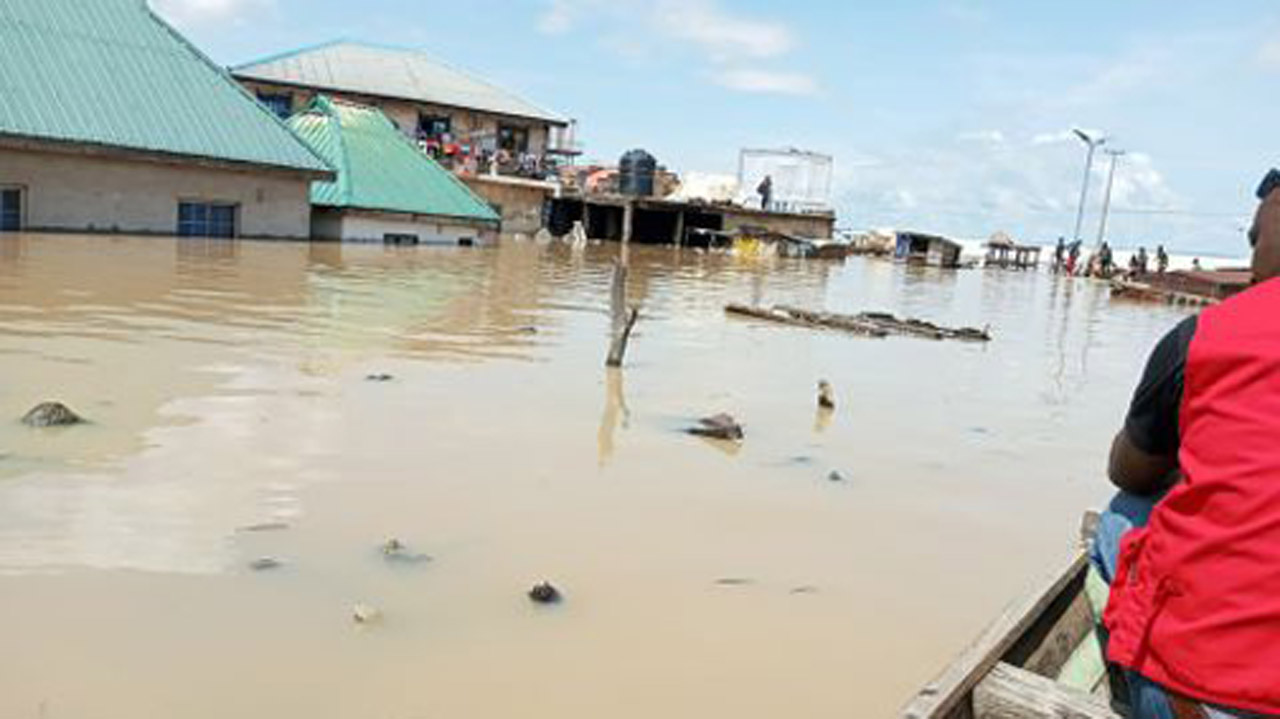
By Dan Amasingha, Minna
Flood has again submerged several farmlands in some communities in Niger State.This followed an early morning rainfall yesterday which ripped through farmĺands in Kafin Koro, Paikoro local government areas of the state.The flood also affected 18 communities in Lapai Local Government Area of the state where some farmlands were also affected, and many others at risk of being swept away.
Some of the affected communities include Dere, Eshi, Apataku, Tsakanabi, Kuchi Kakanda, Arah, Achiba, Rebba, Ebwa, Pele, Edda, Rigido, Gbami, Yawa, Baka, and Muye. The state government on Sunday re-echoed its earlier warning to riverine communities in the state to immediately relocate to higher grounds, saying the rains have intensified across the state.The Special Adviser to the Governor on Communication, Media and Strategy, Jonathan Vatsa, in a statement, appealed to communities in the affected areas to immediately relocate to a safer place to avoid further disaster in the state.Vatsa said that though the government understood the people’s attachment to their ancestral homes, there is the need for them to adhere to the government warning and relocate pending when the rains woulď be over.“We as a government will continue to be proactive by appealing to the people, especially those in the flood-prone areas, to immediately move upland to avoid the experience of the Mokwa disaster.“The government is aware of their attachments to their ancestral homes and lands, but with the various flood alerts, and what we are already experiencing, there is an urgent need for them to heed to the government’s warning.“The Mokwa experience is still very much with us, and we cannot afford a repeat of such an experience.“That is why the government is urging the people to move to a higher ground,” Vatsa said.The special adviser disclosed that the Nigerian Meteorological Agency had previously identified 15 out of the 25 local government areas in the state as very vulnerable to flooding every rainy season.The Federal Government had instructed residents of four local government areas of the state to move to safer locations as heavy rainfall was expected to trigger flooding between July 31 and August 5, 2025.This latest directive by the Federal Government follows a flood alert issued by the National Flood Early Warning Centre under the Federal Ministry of Environment, which revealed that communities in Rijau, Sarkin Pawa, Suleja, and Mashegu are at high risk of flooding during the forecast period.The Federal Government’s warning was contained in a statement titled “Flood Prediction”, signed by the Director of Erosion, Flood, and Coastal Zone Management Department, Usman Bokani, where he urged relevant authorities to take proactive measures to mitigate any disaster.While disclosing that the state government would soon embark on an enlightenment campaign to all the flood-prone communities, Vatsa called on traditional rulers, community and religious leaders to join the government in sensitising the people.NUJ, SERAP Tackle Bago over Closure of Media HouseThe Nigeria Union of Journalists (NUJ), Niger State Council, has condemned the recent directive by Governor Mohammed Umaru Bago to shut down Badeggi FM 90.1, a privately owned radio station based in Minna. The union described the move as an abuse of executive power and a threat to democratic principles.In a statement signed by the council’s Secretary, Adamu Usman Chiji, the NUJ urged Governor Bago to withdraw the closure order and follow due process. The union emphasized that only the National Broadcasting Commission (NBC) has the legal authority to issue or revoke broadcast licenses.“The media plays a critical role in holding public officers accountable,” the statement read. “Any concerns about professional misconduct should be directed to the appropriate regulatory bodies, not met with unilateral shutdown orders.”The NUJ reminded the governor that engaging the media through constructive dialogue, rather than issuing threats, is more in line with democratic norms. It also noted that a revalidation committee led by senior journalist Pastor Dan Amasingha has been established to ensure adherence to journalism ethics in the state.Meanwhile, the Socio-Economic Rights and Accountability Project (SERAP) has added its voice, issuing a 48-hour ultimatum to Governor Bago to reverse the closure and reinstate the station’s broadcasting licence.In a letter dated August 2, 2025, and signed by Deputy Director Kolawole Oluwadare, SERAP described the governor’s actions—including the revocation of the station’s license and threats to demolish its premises as arbitrary, unlawful, and a violation of both Nigerian constitutional rights and international human rights obligations.“Vague and unsubstantiated accusations of incitement cannot justify silencing critical media voices,” SERAP warned. “This move undermines press freedom and has a chilling effect on other media organisations, particularly ahead of the 2027 elections.”The group stressed that freedom of expression and media independence are vital to democracy, and warned of legal action if the state fails to comply with its demands.As of the time of filing this report, the Niger State Government has not responded to the NUJ and SERAP statements.

